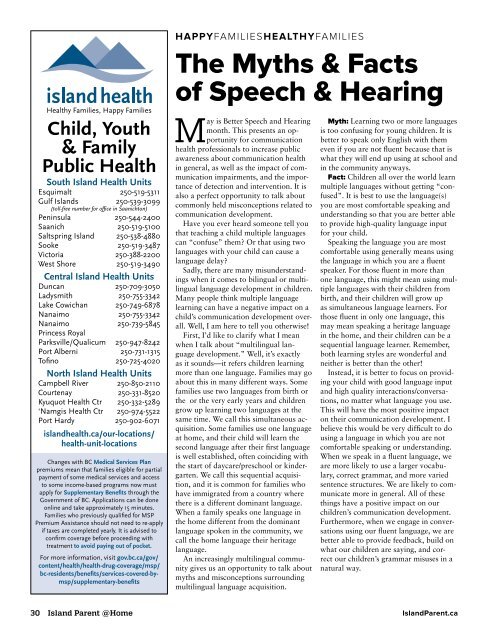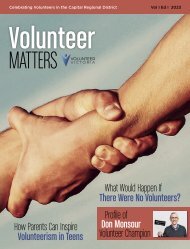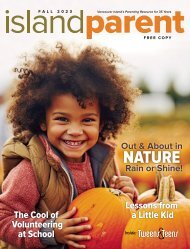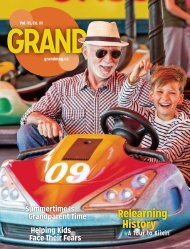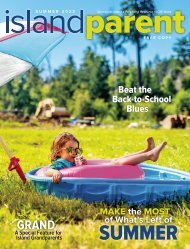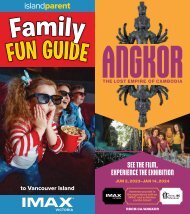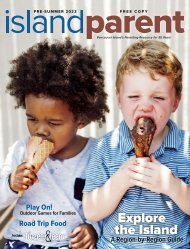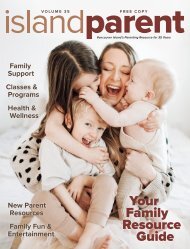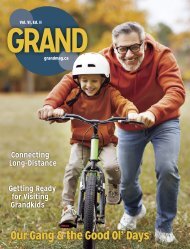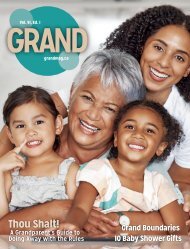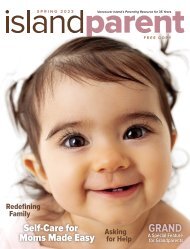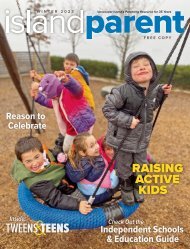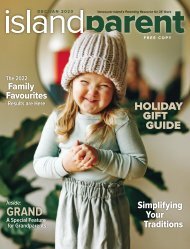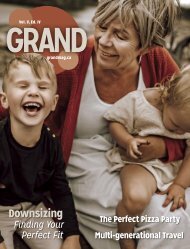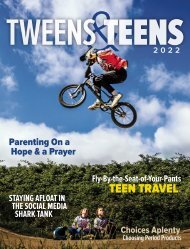IPM May 20
Vancouver Island's Parenting Resource for over 32 years.
Vancouver Island's Parenting Resource for over 32 years.
Create successful ePaper yourself
Turn your PDF publications into a flip-book with our unique Google optimized e-Paper software.
Healthy Families, Happy Families<br />
Child, Youth<br />
& Family<br />
Public Health<br />
South Island Health Units<br />
Esquimalt 250-519-5311<br />
Gulf Islands 250-539-3099<br />
(toll-free number for office in Saanichton)<br />
Peninsula 250-544-2400<br />
Saanich 250-519-5100<br />
Saltspring Island 250-538-4880<br />
Sooke 250-519-3487<br />
Victoria 250-388-2<strong>20</strong>0<br />
West Shore 250-519-3490<br />
Central Island Health Units<br />
Duncan 250-709-3050<br />
Ladysmith 250-755-3342<br />
Lake Cowichan 250-749-6878<br />
Nanaimo 250-755-3342<br />
Nanaimo 250-739-5845<br />
Princess Royal<br />
Parksville/Qualicum 250-947-8242<br />
Port Alberni 250-731-1315<br />
Tofino 250-725-40<strong>20</strong><br />
North Island Health Units<br />
Campbell River 250-850-2110<br />
Courtenay 250-331-85<strong>20</strong><br />
Kyuquot Health Ctr 250-332-5289<br />
‘Namgis Health Ctr 250-974-5522<br />
Port Hardy 250-902-6071<br />
islandhealth.ca/our-locations/<br />
health-unit-locations<br />
Changes with BC Medical Services Plan<br />
premiums mean that families eligible for partial<br />
payment of some medical services and access<br />
to some income-based programs now must<br />
apply for Supplementary Benefits through the<br />
Government of BC. Applications can be done<br />
online and take approximately 15 minutes.<br />
Families who previously qualified for MSP<br />
Premium Assistance should not need to re-apply<br />
if taxes are completed yearly. It is advised to<br />
confirm coverage before proceeding with<br />
treatment to avoid paying out of pocket.<br />
For more information, visit gov.bc.ca/gov/<br />
content/health/health-drug-coverage/msp/<br />
bc-residents/benefits/services-covered-bymsp/supplementary-benefits<br />
HAPPYFAMILIESHEALTHYFAMILIES<br />
The Myths & Facts<br />
of Speech & Hearing<br />
<strong>May</strong> is Better Speech and Hearing<br />
month. This presents an opportunity<br />
for communication<br />
health professionals to increase public<br />
awareness about communication health<br />
in general, as well as the impact of communication<br />
impairments, and the importance<br />
of detection and intervention. It is<br />
also a perfect opportunity to talk about<br />
commonly held misconceptions related to<br />
communication development.<br />
Have you ever heard someone tell you<br />
that teaching a child multiple languages<br />
can “confuse” them? Or that using two<br />
languages with your child can cause a<br />
language delay?<br />
Sadly, there are many misunderstandings<br />
when it comes to bilingual or multilingual<br />
language development in children.<br />
Many people think multiple language<br />
learning can have a negative impact on a<br />
child’s communication development overall.<br />
Well, I am here to tell you otherwise!<br />
First, I’d like to clarify what I mean<br />
when I talk about “multilingual language<br />
development.” Well, it’s exactly<br />
as it sounds—it refers children learning<br />
more than one language. Families may go<br />
about this in many different ways. Some<br />
families use two languages from birth or<br />
the or the very early years and children<br />
grow up learning two languages at the<br />
same time. We call this simultaneous acquisition.<br />
Some families use one language<br />
at home, and their child will learn the<br />
second language after their first language<br />
is well established, often coinciding with<br />
the start of daycare/preschool or kindergarten.<br />
We call this sequential acquisition,<br />
and it is common for families who<br />
have immigrated from a country where<br />
there is a different dominant language.<br />
When a family speaks one language in<br />
the home different from the dominant<br />
language spoken in the community, we<br />
call the home language their heritage<br />
language.<br />
An increasingly multilingual community<br />
gives us an opportunity to talk about<br />
myths and misconceptions surrounding<br />
multilingual language acquisition.<br />
Myth: Learning two or more languages<br />
is too confusing for young children. It is<br />
better to speak only English with them<br />
even if you are not fluent because that is<br />
what they will end up using at school and<br />
in the community anyways.<br />
Fact: Children all over the world learn<br />
multiple languages without getting “confused”.<br />
It is best to use the language(s)<br />
you are most comfortable speaking and<br />
understanding so that you are better able<br />
to provide high-quality language input<br />
for your child.<br />
Speaking the language you are most<br />
comfortable using generally means using<br />
the language in which you are a fluent<br />
speaker. For those fluent in more than<br />
one language, this might mean using multiple<br />
languages with their children from<br />
birth, and their children will grow up<br />
as simultaneous language learners. For<br />
those fluent in only one language, this<br />
may mean speaking a heritage language<br />
in the home, and their children can be a<br />
sequential language learner. Remember,<br />
both learning styles are wonderful and<br />
neither is better than the other!<br />
Instead, it is better to focus on providing<br />
your child with good language input<br />
and high quality interactions/conversations,<br />
no matter what language you use.<br />
This will have the most positive impact<br />
on their communication development. I<br />
believe this would be very difficult to do<br />
using a language in which you are not<br />
comfortable speaking or understanding.<br />
When we speak in a fluent language, we<br />
are more likely to use a larger vocabulary,<br />
correct grammar, and more varied<br />
sentence structures. We are likely to communicate<br />
more in general. All of these<br />
things have a positive impact on our<br />
children’s communication development.<br />
Furthermore, when we engage in conversations<br />
using our fluent language, we are<br />
better able to provide feedback, build on<br />
what our children are saying, and correct<br />
our children’s grammar misuses in a<br />
natural way.<br />
30 Island Parent @Home IslandParent.ca


